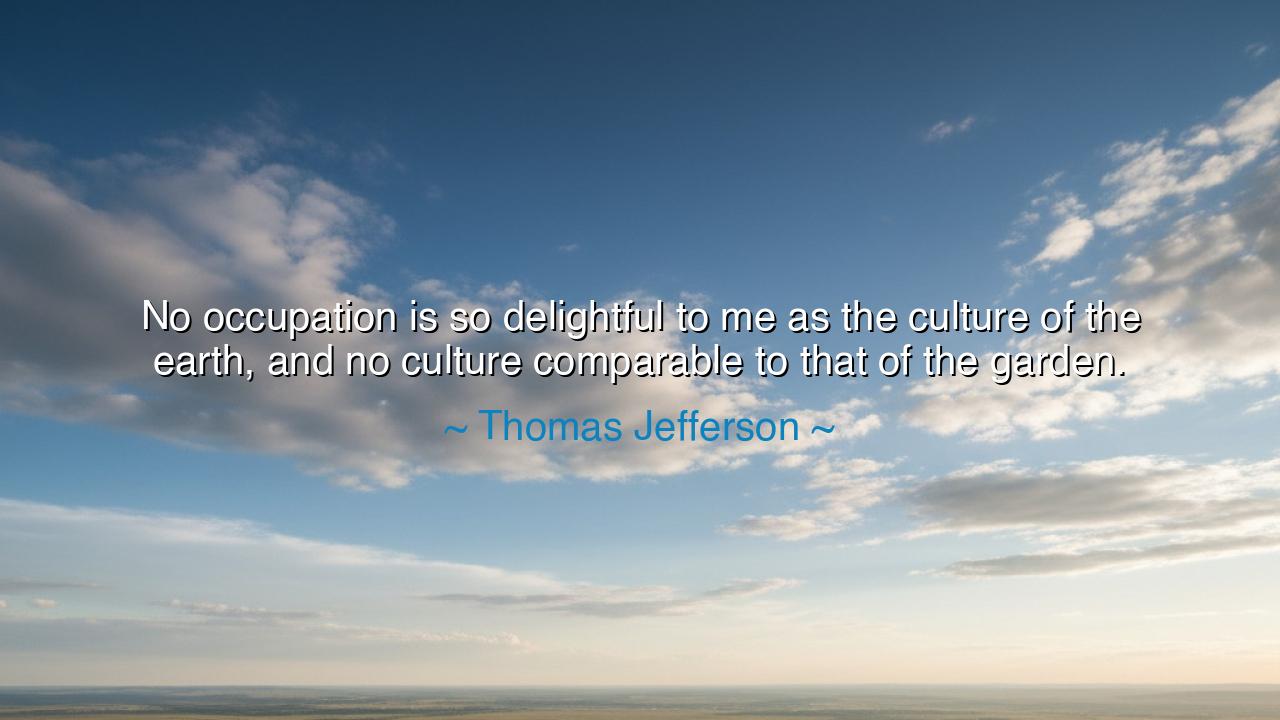
No occupation is so delightful to me as the culture of the earth
No occupation is so delightful to me as the culture of the earth, and no culture comparable to that of the garden.






In the vast expanse of human endeavor, there are few callings that stir the soul as deeply as the work of cultivating the earth. The words of Thomas Jefferson resound through the ages, echoing a timeless truth: "No occupation is so delightful to me as the culture of the earth, and no culture comparable to that of the garden." In these words, Jefferson reveals a profound connection between the human spirit and the earth, a connection that transcends the mere act of planting seeds and nurturing them. Gardening, in its truest sense, is not just a task; it is a sacred vocation, a calling that binds us to the rhythms of nature, to the cycles of life and death, and to the eternal process of growth and renewal.
To cultivate the earth is to engage in a work that is both physical and spiritual. The garden is a place where human hands touch the soil, where sweat mingles with earth, and where effort brings forth life. Jefferson, ever the philosopher, saw this work not as labor, but as a blessing—a calling that nourishes not just the body but the soul. Just as the ancients believed that to tend the land was to serve the gods, Jefferson understood that in caring for the earth, we engage in something far greater than mere survival. We participate in the divine process of creation, shaping the land and receiving its gifts in return.
This connection between human effort and the earth is as old as civilization itself. The great civilizations of Mesopotamia and Egypt, which arose in the fertile plains between the rivers, recognized the significance of gardening as a reflection of the divine. The act of planting and tending to the soil was not simply a matter of sustenance; it was a sacred act. The Sumerians, for example, celebrated the fertility of their lands as a gift from the gods, and they believed that to cultivate the earth was to honor the divine forces that sustained all life. Similarly, the ancient Egyptians built gardens not only for practical use but as a way to connect with the divine, to create places of beauty and renewal. To work the land was to acknowledge the sacredness of life itself.
Consider the example of George Washington, a contemporary of Jefferson, who shared his love for the garden. Washington was not just a leader in war and politics; he was also a passionate gardener. At Mount Vernon, his estate, he cultivated fields of crops and flowers with an attention to detail that reflected his deep connection to the land. For Washington, gardening was not a pastime, but a way of life. It was through this work that he found peace and purpose, much as Jefferson did. Their mutual appreciation for the garden was rooted in the understanding that the act of cultivation is more than just labor—it is a form of meditation, a means to renew the body and soul.
Jefferson’s words remind us that the garden is not just a place of beauty, but a space where one can connect to the deeper rhythms of life. It is in the garden that we learn the true value of patience, the importance of nurturing, and the wisdom that comes from witnessing the cycles of nature. Every seed planted is a testament to hope, every bloom that bursts forth from the soil is a reminder of renewal. The garden teaches us that growth takes time, that every effort we make to nurture life will yield fruit in its own time. Through the work of gardening, we align ourselves with the natural order, learning to appreciate the slow and steady process of transformation.
In our modern world, where the hustle and bustle of life often drown out the quieter calls of the earth, Jefferson’s words remain a powerful reminder to return to the land, to reconnect with the earth beneath our feet. The garden offers us a refuge, a space where we can find solace, where we can slow down and witness the miracles of nature unfolding before our eyes. It is a place where the soul is nourished, where the spirit is renewed by the simple act of tending to something greater than ourselves. And as we do so, we are reminded that we are not separate from the earth but a part of it, deeply intertwined with the cycles of life that have sustained humanity since the dawn of time.
Let Jefferson’s wisdom guide us in our own lives. Let us cultivate our own gardens, whether they are literal patches of earth or the metaphorical gardens of our lives. Let us invest time and energy into what matters—our relationships, our passions, our purpose—and tend to them with the same care and dedication we give to the earth. As we do so, we will find that, like Jefferson, we too will experience the deep satisfaction that comes from this act of cultivation. In the garden, we find not just food for the body, but peace for the mind and fulfillment for the soul. The garden, in all its simplicity and beauty, is a reflection of the divine, and through it, we find our connection to the eternal cycles of life.






AAdministratorAdministrator
Welcome, honored guests. Please leave a comment, we will respond soon